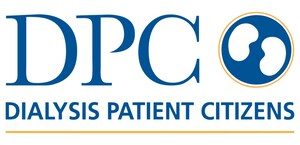GAO Notes that Care Partner Requirement Remains a Significant Barrier to Home Hemodialysis Use, But Report Neglects to Recommend Policy Options, says Dialysis Patient Citizens
WASHINGTON, Nov. 17, 2015 /PRNewswire-USNewswire/ -- A long-awaited GAO report on home dialysis agrees with survey research by Dialysis Patient Citizens (DPC) that the need for a care partner to assist in home hemodialysis may depress the use of this technology, but omits any policy recommendations to address this problem. GAO observed that "successfully performing home dialysis requires patients to undergo training and assume other responsibilities that they would not otherwise have if they dialyzed in a facility. As a result, patients who feel unprepared to accept such responsibilities or who lack a spouse or caregiver to help them may be less likely to choose home dialysis."
"While DPC supports GAO's recommendations, the Agency missed a critical opportunity to address the biggest barrier for dialysis patients – do they have the support necessary to go home," said DPC's Executive Director Hrant Jamgochian. "Frankly, we had hoped that GAO would look at more policy options to further support patients and their ability to go home, ranging from Medicare payment for a home aide (as was permitted prior to 1990) to relaxing the FDA requirement of a care partner."
Instead, the GAO recommended that: 1) CMS take steps to improve the reliability of the cost report data for treatment and training associated with specific types of dialysis; 2) CMS examine monthly payments to physicians to manage the care of dialysis patients; and 3) CMS examine the Kidney Disease Education benefit and potentially work to expand the categories of providers and patients eligible for the benefit.
DPC's 2015 Annual Membership Survey found that while about 72 percent of ESRD patients are informed about the option of home hemodialysis, only 26 percent seriously considered it. For those within the 46 percent gap of patients who were informed but did not consider it, the most frequently cited (45%) reason for not considering it was the feeling of safety in a professionally-staffed clinic. However, 37 percent of patients reported that they could not consider home hemodialysis because they had no one to help them.
While most in-center dialysis patient respondents say they have made up their minds to continue receiving treatment at the clinic, at least 20 percent say would be willing to dialyze at home if they could meet the care partner requirement. Among survey respondents who previously dialyzed at home but now receive in-center treatment, 18 percent ceased home hemodialysis because of care partner issues.
Another home dialysis modality is peritoneal dialysis (PD). While an outstanding treatment option for some patients, many may have to give up PD at some point when the peritoneal membrane develops scar tissue from infections or overuse of stronger dextrose solutions. PD can be administered at home without assistance, but a separate DPC survey of PD patients found that 30 percent would not be able to meet the care partner requirement of home hemodialysis and would have to abandon home modalities for in-center treatment.
Some potential options to overcome this barrier include Medicare payment for a home aide, as was permitted prior to 1990, or relaxing the FDA requirement of a care partner. In addition, in the past, monitoring was provided by the large dialysis companies for home hemodialysis patients that were performing their treatments at night (nocturnal). Many dialysis companies are producing equipment that will keep patients safer during their home hemodialysis treatments.
DPC's 2015 Annual Membership Survey was conducted in July by the international research firm Ipsos, and was sponsored by Abbott and Amgen.
Dialysis Patient Citizens (DPC) is America's largest patient-led organization representing dialysis patients. With a membership of more than 29,000 dialysis and pre-dialysis patients and their families, DPC's mission is to improve the quality of life of dialysis patients by engaging policy makers, providers and the public. Through patient education, empowerment and advocacy, DPC works to increase awareness about kidney disease and promote favorable public policy.
dialysispatients.org
Contact:
Hrant Jamgochian, JD, LL.M.
Executive Director
Dialysis Patient Citizens
1012 14th Street NW, Suite 905
Washington, DC 20005
[email protected]
Phone: 202-789-6933
Toll free: 866-877-4242
Fax: 202-789-6935
SOURCE Dialysis Patient Citizens
Related Links
WANT YOUR COMPANY'S NEWS FEATURED ON PRNEWSWIRE.COM?
Newsrooms &
Influencers
Digital Media
Outlets
Journalists
Opted In





Share this article